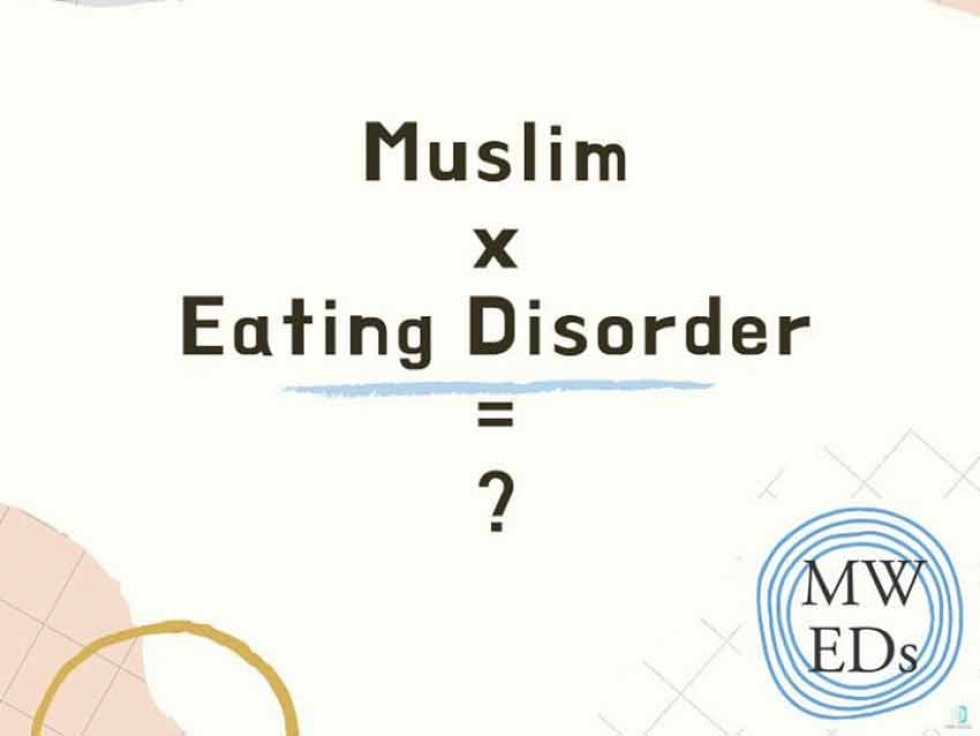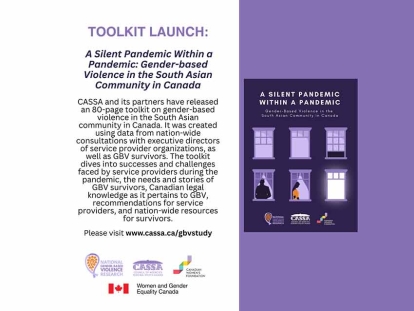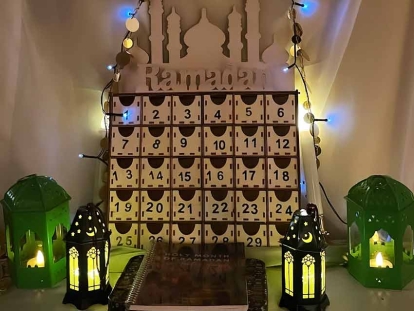 Muslims with Eating Disorders Instagram Page
Muslims with Eating Disorders Instagram Page
Jul
Instagram Page Hopes to Raise Awareness about the Reality of Eating Disorders Among Muslims in Canada
Written by Chelby DaigleMuslims with Eating Disorders (MWED) is an Instagram Page set up with the aim to raise awareness about the reality that Muslims are struggling with this mental health issue.
According to the National Initiative on Eating Disorders, "Approximately, 1 million Canadians meet the diagnostic criteria for an Eating Disorder, such as Anorexia Nervosa (AN), Bulimia Nervosa (BN), Binge Eating Disorder (BED), Avoidance Restrictive Food Intake Disorder (ARFID) and Otherwise Specified Feeding and Eating Disorder (OSFED). Moreover, the incidence of Eating Disorders in Canadian children [both girls and boys] is estimated to be 2 to 4 times greater than Type 2 Diabetes."
Muslim Link reached out to the founder of Muslims with Eating Disorders (MWED), who wishes to remain anonymous, about why she felt it was important to create such a platform for the Muslim community.
1. Tell us about yourself
I am a second generation South Asian immigrant, born and raised in Toronto, Ontario. I recently graduated from York University, earning my BA in Psychology and I made it on the dean of Honours list. I also earned a certification from Seneca College in Rehabilitation Services. This joint program enabled me to gain 800 hours of work place experience during my last two years of undergrad. I'm humbled to say, currently I am a Resident Support Worker/Online Hub Coordinator at a women's safety shelter in Toronto.
2. When did you first learn about “eating disorders”?
Honestly, I can't remember the first time I really "learned" about eating disorders. From what i can remember, it was probably something I google searched after realising some of the behaviours I was exhibiting weren't normal, and I didn't feel like my peers or friends were the same. It wasn't until getting a professional diagnosis from my family doctor and later from my therapy team at the hospital that I became educated about all my underlying symptoms in detail. Before being clinically diagnosed with an eating disorder it wasn't really a certain condition or illness I even knew or cared about. And I think that's where a lot of the shame and stigma is rooted in- this idea of this taboo eating "condition" that only a fraction of people experience, which in fact impacts thousands of individuals on a yearly basis, and has one of the highest mortality rates of all mental health disorders in Canada.
3. Why did you decide that an anonymous Instagram Page would be the best way to offer support to Muslims living with eating disorders in Canada?
I don't believe it's the best way to offer support to Muslims living with Eating Disorders in Canada. My main aim with this page is to shed a light and encourage healthy discourse on the illness and its existence amongst so many in Canada, and secondly to implement a Islamic lens on the matter and highlight the existence of an intersectional lens. To me the best way to offer support for those with eating disorders is through direct professional help, so the process of assessment, receiving a diagnosis and then going to and implementing therapy. My page on Instagram is simply a tool to attract awareness and ignite, hopefully, dialogue amongst the public and our Muslim community that this exists within us.
5. In one of your Instagram posts, it is stated that eating disorders are a product of “social, cultural, and historical factors”). What “social, cultural, and historical factors” do you see impacting the lives of Muslims with eating disorders in Canada?
I think when it comes to social factors it's pretty apparent/obvious and widespread the existing expectations that are placed on a nearly perfect aesthetic appearance, and overall social pressures to have it "all together, all the time" including the food you eat, and the weight you weigh. It's been going on for generations and particularly is targeted towards women- to be disciplined enough to "fit a standard" that in most cases is not sustainable or healthy for them.
Cultural factors varies from individual to individual, and I can truly only speak from my experience as a woman of South Asian descent which comes with many expectations as well, both explicit and implicit. To me, what was most debilitating was my own internalised pressures to make my parents proud, and maintain a certain cultural ideal or image, because in my head, being and maintaining a certain body type was also securing that constant approval, instant gratification and love from my parents- and I believe this stems from that cultural basis for the most part.
When it comes to history, we can look to the past when it comes to idealising the poster image of perfect bodies, or placing able-bodied, upper class and white bodies on a pedestal. This sort of imagery and mass idealisation does more than create attraction - it becomes the standard of beauty, and thus of attainment. I'm really just scratching the surface here- there's obviously more history beneath eating disorders and its acquisition, for example when it comes to certain influential people who advocated for unhealthy behaviours and lifestyle, or perhaps the colonial theft of this land to begin with, that can actually unveil some truths and carried on trauma with this illness.
6. What are some of the barriers experienced by Muslims living with eating disorders living in Canada to accessing support from within the Muslim community?
Definitely one of them is religious blame- the idea that as a "good practising Muslim" you shouldn't have any illness, especially mental health illnesses to begin with, because you believe in God. However each individual is complex in their own needs and thresholds of pain/stress/ability to cope. Add to that cultural norms and standards, social beliefs and practises of beauty and many many more determinants of this illness, no amount of prayer and connection with Allah can change your Qadr (destiny) or plans of what the Al-mighty has in store for you. So, I think we need to, as a community, focus on being there for one another, supporting our youth and high risk populations rather than going straight to lecturing them on what they're doing wrong or should be doing to avoid pain. Another barrier that comes to mind is being framed as too sensitive or emotional when opening up to our respected seniors or caregivers about what we're going through, often we're told "we have it too easy" or "to stop being so self-centred", these statements can do more harm than good when people are in pain, and don't have the right resources to access. That's why I stress really seeking that professional therapy first, because in it you become more aware of what you have, and learn ways to cope.
7. What are some of the barriers experienced by Muslims living with eating disorders living in Canada to accessing treatment and support from mainstream health care institutions?
I can speak from personal experience here- for me it was not seeing enough variety, or in better terms, diversity in the room meaning Muslims with eating disorders. When I was in group therapy sessions, it was mostly white women. Now, the treatment and program structure I feel wasn't outwardly specific to one type of person (white/able-bodied/heterosexual etc.) but it was just the dialogue and conversations that took up most of the days amongst us that were hard to resonate/relate to. Also the barrier or not feeling able to openly speak about my religion and its great therapeutic elements in my recovery process - it was never prohibited, and I'm free to do it on my own, but not having the guided tools or Islamic psychotherapy to utilise as a Muslim with a eating disorder. I see places like Khalil Center Canada-which is now located in Toronto that as doing amazing work, integrating Islamic-based psychotherapy that I feel will greatly and in a positive way impact mental illness and aid for Muslims who need this type of therapeutic support.
8. How are you trying to incorporate an “Islamic” lens into discussions around eating disorders?
With my Instagram page, I bring forward and try to amplify the practices and beliefs of Islam in hope to integrate them with the main overarching causes and maintainers of eating disorders. Ideas like respecting our bodies because it is not truly ours, but a vessel given to us by Allah swt, so it is in our best interest as Muslims to honour the needs of our bodies and be in tune with our body. Islam also advocates for balance, and judging one and another based on our character (akhlaaq) and the way we treat each other, not the way we outwardly appear.
9. Do you feel that your page will eventually organise Instagram Lives and other opportunities for discussion and information sharing than Instagram Posts?
Yes definitely! That is a long-term goal for Muslims with Eating Disorders (MWED). Right now we are at the stage of creating a network of professionals and other figures in our community who can speak to the identity of Muslims with eating disorders.
10. What support do you need from the community to achieve your Page’s goals?
As a grassroots organization right now being solely managed by myself, I truly am looking for volunteer administration support and possibly an advisory/mentors team who can help guide me from concept to a working team and organization (one day) providing, facilitating services and community supports to Muslims struggling with eating disorders and/or other debilitating mental health struggles.
11. Is there anything else you would like to add?
Thank you for this opportunity! And to anyone who made it this far, I greatly appreciate your time and thank you for listening to understand.
If I am able to get one person thinking and learning about this illness more than what they knew before, than I have done what I set out to do! And please don't forget to follow us on Instagram @MUSLIMS_EDS and if you are interested in getting involved please email This email address is being protected from spambots. You need JavaScript enabled to view it.
This article was produced exclusively for Muslim Link and should not be copied without prior permission from the site. For permission, please write to info@muslimlink.ca.
















